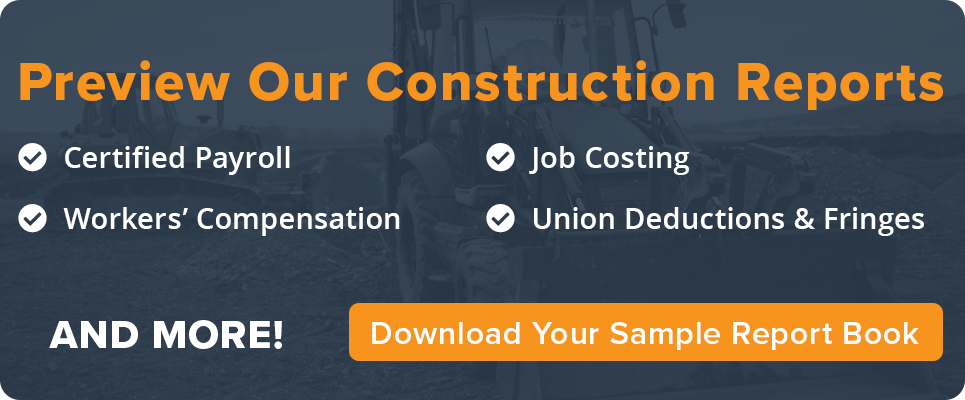How to Ensure Your Construction Payroll Follows Government Guidelines

July 31, 2024
Meeting government payroll compliance is a complicated, ever-changing process, subject to many regulations with strict penalties if not obeyed correctly.
From adhering to the state minimum wage laws to more complex requirements, such as federal income tax calculations and record keeping, businesses are expected to follow specific steps to complete correct and timely payroll.
However, in addition to tracking current government requirements, federal, state and local regulations are all subject to frequent change, making it challenging to stay up to date.
Furthermore, limited staff and time constraints add further difficulty for any businesses to meet these important deadlines.
This article will explore the intricacy of government payroll guidelines, how to understand them and the ramifications of not complying.
While some may attempt to avoid the complexity of payroll, such as hiring subcontractors who aren’t filed as employees, the best course of action is always to meet and maintain expected regulations.
Let’s look at how best to ensure government payroll compliance, by learning about the agencies which mandate them and the invaluable benefits of a construction payroll service.
Key Takeaways:
-
Construction businesses face unique payroll challenges, including complex legal requirements such as the Davis-Bacon Act, which mandates specific wage rates for federal and public projects.
-
Compliance with certified payroll requirements, including submission of weekly reports detailing wages, hours worked, and overtime rates, is crucial for contractors, especially if they’re working on federal projects.
-
Multi-state operations compound payroll complexities, requiring construction businesses to navigate varying state regulations, tax requirements, and union requirements across different jurisdictions.
-
Specialized construction payroll providers offer valuable solutions for managing complex construction payroll issues and ensuring adherence to Davis-Bacon labor standards and other industry-specific regulations.
-
Outsourcing payroll to construction payroll services can significantly reduce the risk of non-compliance, saving time and resources while helping businesses navigate the intricacies of construction payroll, from fringe benefits calculations to overtime rates.
Construction Payroll Compliance in the U.S.
Multiple agencies dictate payroll compliance within the United States, often making it complicated for employers to navigate the many tax requirements and payroll stipulations, which are spread across local, state and federal jurisdictions.
Larger agencies, such as the Internal Revenue Service (IRS) and the Department of Labor (DOL), can also delegate to smaller divisions under their operation, which can further complicate meeting compliance for businesses unfamiliar with this field.
While these agencies oversee a broad and complex range of matters within the U.S., there are still a few vital payroll related regulations that businesses should absolutely be familiar with.
Payroll Taxation and Managing Agencies:
- Federal Income Tax: Managed and administered by the Internal Revenue Service (IRS), Federal Income Tax applies to all workers. The amount withheld is determined by an individual’s tax bracket, filing status, credits, and number of exemptions claimed.
- As a federal agency, the IRS is responsible for collecting government owed taxes, processing tax returns and conducting audits to ensure tax law compliancy.
- The IRS requires that all employers obtain a W-4 form for each new hire, as well as generate a W-2 form at the beginning of each year for each employee, which shows the taxes withheld from their total earnings.
- Social Security and Medicare Tax: Overseen by the IRS, in conjunction with the Social Security Administration (SSA) and the Center for Medicare & Medicaid Services (CMS), Social Security and Medicare taxes, also known as FICA (Federal Insurance Contributions Act), are withheld from every paycheck.
- Contributions into Social Security and Medicare go towards benefits for retirement, disability, and survivorship. Employers must match an equal contribution as their employees, which are deposited biweekly or monthly, along with filing 941 form.
- Federal Unemployment Tax: The IRS also manages the Federal Unemployment Tax Act (FUTA), which all employers are required to pay into. This tax funds the federal-state unemployment insurance (UI) system, providing temporary financial assistance to unemployed and displaced workers who have been laid off.
- FUTA only applies to employers, withholding 6% tax on the first $7,000 each employee is paid annually, with a 940-form required quarterly.
- State Taxes: Each state has its own tax agency responsible for administering and enforcing compliance, with a variety of laws and regulations.
- However, most states have common requirements, such as state tax withholding and State Unemployment Tax (SUTA), which employers are required to further calculate in employee payroll. Like Federally managed agencies, state taxes and regulations also come with strict penalties that will be enforced if compliance is not met.
Construction Payroll Regulations:
- Registration and Classification of Employees: The federal government requires all employers to report newly hired or rehired employees to the state within a certain time frame under the Personal Responsibility and Work Opportunity Reconciliation Act (PRWORA) of 1996.
- Additionally, the employer must ensure that employees are classified correctly and are compensated and treated fairly based on their job classification. Failure to do so can result in legal and financial consequences for the employer.
- Benefits: Employee benefits widely vary depending on the business, state, and employee classification. However, federally regulated benefits, such as health insurance and retirement plans, are more stringent and require annual employer reporting. The IRS also dictates non-taxable vs. taxable benefits, which can include life insurance and disability pay.
- Fair Labor Standard Act (FLSA): The Fair Labor Standard Act is overseen by the Wage and Hour Division (WHD) of the U.S. Department of Labor (DOL). As a Federal act, FLSA mandates standards for minimum wage, overtime pay and child labor for full-time and part-time employees.
- Employers must record all employee time and wages as stipulated by FLSA standards, which applies to the private sector in addition to Federal, State and local governments.
- Davis-Bacon and Related Acts (DBRA): Often referred to as “prevailing wage,” Davis-Bacon mandates that contractors and subcontractors contracted under federally funded projects must pay their laborers a minimum wage equal to the wages of similar projects in the local area.
- Typically, contracts exceeding $2,000 are subject to Davis-Bacon, categorized by factors, such as laborer’s role and site usage. Davis-Bacon and Related Acts are overseen by the Wage and Hour Division (WHD) within the U.S. Department of Labor, with a slew of requirements to meet compliance, including certified payroll reports.
Managing Multi-State Payroll in Construction
For any business operating in multiple states, payroll compliance can become a strenuous challenge. Even if an employee only commutes or works remote from out of state, a business is still required to adhere to necessary multi-state payroll regulations.
This involves calculating salaries, taxes, deductions, and payment distributions, made complex by varying requirements across states.
The more states a business operates in, the more challenging it can be to keep up with all the complexity. Because each state has its own unique format and deadlines, tracking multiple state taxes and payroll reports can cause serious strain.
In addition, severe legal consequences, such as lawsuits and fines, can come with even a simple mistake.
How to Ensure Multi-State Compliance:
Along with the complex calculations needed for payroll, there are many regulations that employers must navigate. With stiff penalties and fines at risk, ensuring your company meets all government, state, and local payroll requirements is crucial.
Outsourcing to a construction-specific payroll service is critical for alleviating many of these strains, saving a business valuable time and energy.
While manual procedures are susceptible to human error, sophisticated payroll services can streamline and safeguard a business’ compliance, reducing the risk of costly fines and penalties.
Furthermore, construction payroll services track changes or updates in payroll regulations, which manual processing may miss.
Tips for Payroll Tax Compliance in Construction
With a plethora of payroll tax compliance requirements, always remember the following when processing payroll:
- Check wage and overtime calculations multiple times to ensure they are correct.
- Use the following percentages for withholding: Social Security 6.2% (look at wage-based limitations for this), Medicare 1.45%. The employer portion combined is 7.65% and must be submitted for payment and withholding.
- Follow the employee’s W-4 and use the current IRS 15-T form (Federal Income Tax Withholding Methods) to determine the amount to withhold.
- Always make on-time payments to local, state and government agencies during designated periods (weekly, bi-weekly, monthly, quarterly, annually).
- Keep and organize employee files with appropriate forms filled out and signed.
How Construction Payroll Service Helps
Managing all this information is a challenge, exasperated by impending deadlines. Outsourcing to a construction-specific payroll service can mitigate these struggles, by saving information from the previous week, tracking PTO, hours worked, and overtime, performing employee tax calculations, files and pays taxes, and helping with compliance for you.
In addition, construction payroll services offer a variety of tools for contractors to implement into their day-to-day and scheduled payroll operations. Automated calculations and reporting saves contractors time and resources, with accurate time tracking that reduces risk of penalties and errors.
Flexible scalability allows payroll services to accommodate and shift with growing business. And integration with other systems, such as accounting, can allow streamlined workflows and efficient integration with job costs and payroll. Construction payroll services also offer compliance management, which keeps contractors in line with federal, state and local regulations, which, as shown, can often be very complex.
When working with unions, contractors have added government compliance that must be met. Many payroll services have valuable understandings of how to navigate complicated and frequently altered government regulations, which can be an immense benefit to contractors.
Some construction payroll services even offer a variety of employee self-service tools, such as mobile apps, online payroll portals and cloud accessibility.
However, in the end, contractors can enjoy more security, knowing that their payroll data and systems are protected, saving them precious time and revenue.
Save Time With Payroll4Construction: A Construction Payroll Service
Meeting government payroll regulations can be tricky, with many different agencies managing taxation, requirements and other government acts. Contractors must comply with all these government regulations or face strict penalties.
Furthermore, if a business is working in multiple states, different state requirements must be observed and followed, including taxes, deductions and deadlines.
And while there are many tips and tricks for contractors to manage meeting government payroll compliance on their own, a construction-specific payroll service will offer the most benefit in reducing cost and potential mistakes.
At Payroll4Construction, we offer construction-specific services and work exclusively in the construction industry. From tracking simple hourly employees and tax calculation to construction-specific benefits, like certified payroll reporting and multi-state payroll, we handle it all.
Contact us now at Payroll4Construction to book a demo or request a quote and see how easy meeting government payroll compliance can be.
Share Article
Keep on current news in the construction industry. Subscribe to free eNews!


